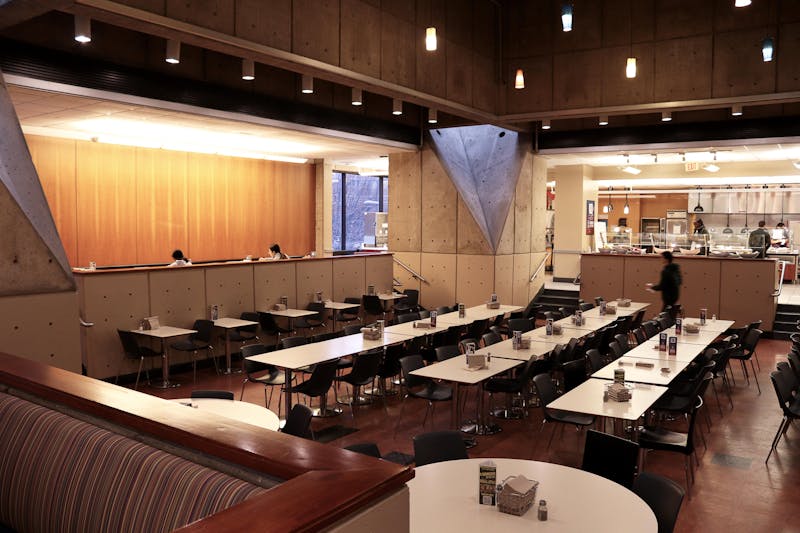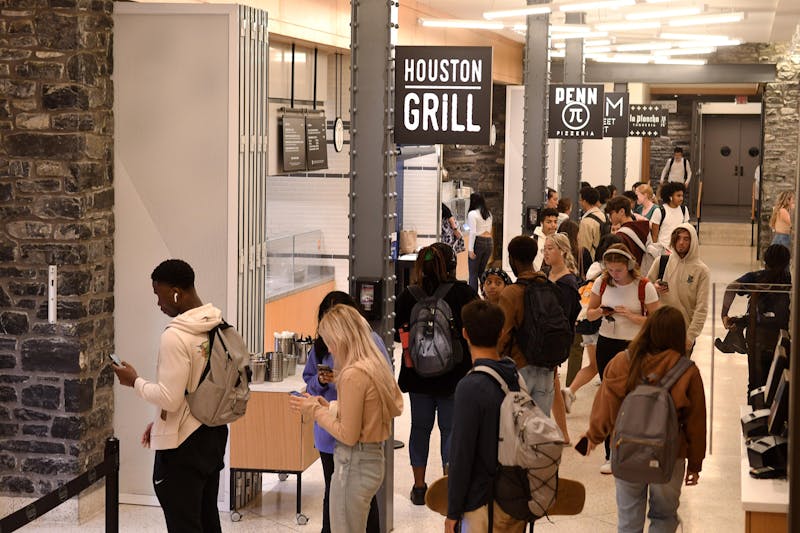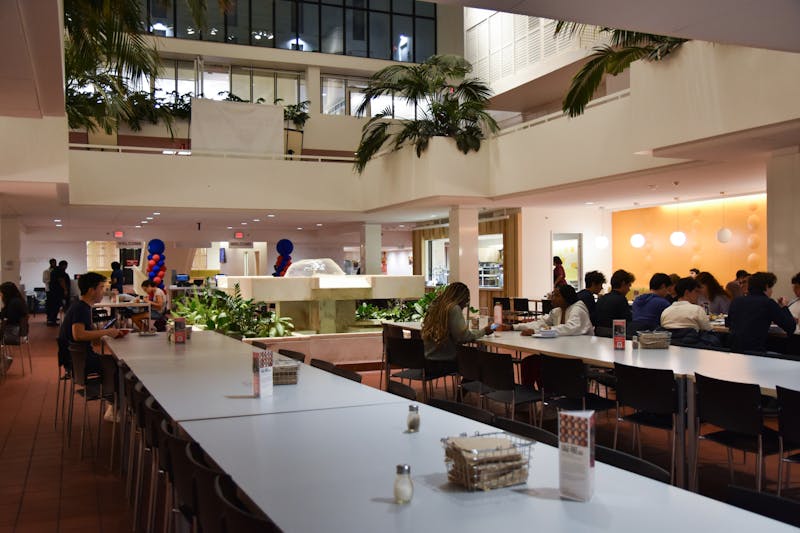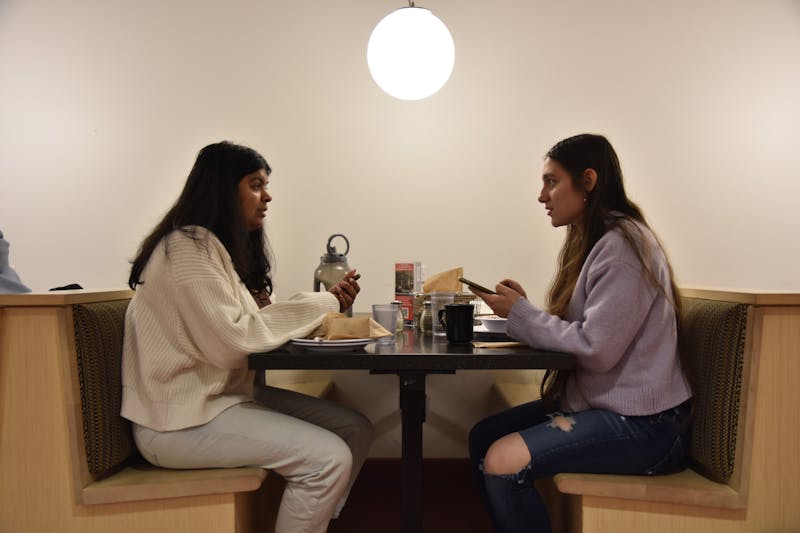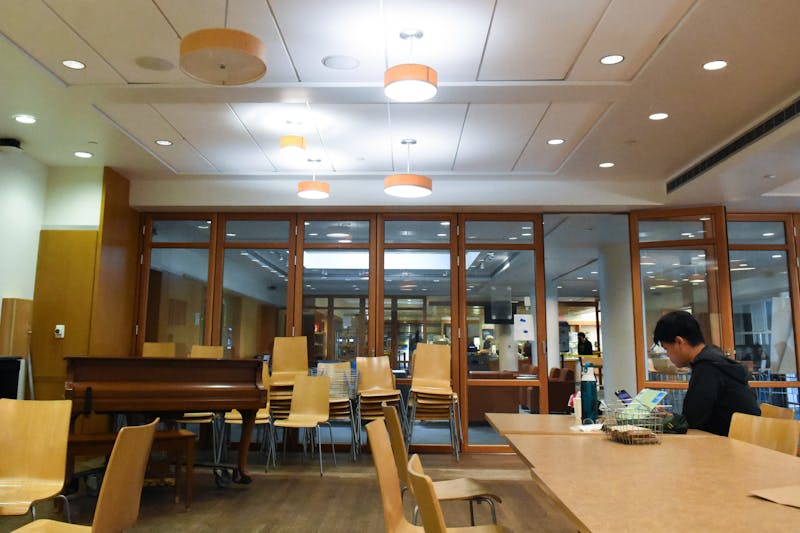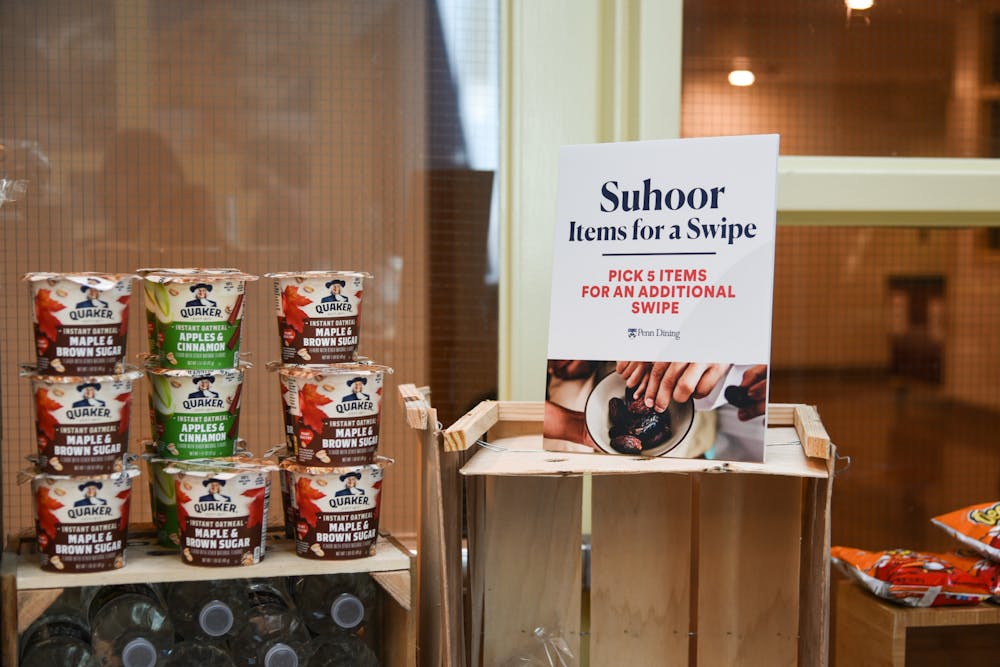
From now through April 9, the English College House dining hall will be offering suhoor and iftar meals for students celebrating Ramadan.
Credit: Chenyao LiuSome Muslim students have raised concerns with Penn Dining’s Ramadan food options and the quantity of Halal food available on campus on weekends.
Ramadan — which began on March 10 and ends April 9 — is a holy month of fasting in Islam. During Ramadan, Muslims fast from sunrise to sunset, break the fast in the evening with an iftar meal, and eat another meal, called suhoor, just before sunrise. While Penn Dining has offered special food offerings during Ramadan this year and in the past, several Muslim students voiced disappointment with their options.
In a March 15 email sent to all students on a dining plan, Penn Dining said that it would provide meals for suhoor and iftar at Kings Court English College House. Penn Dining added that it would also have options for suhoor at Gourmet Grocer, which could be picked up during the day for one meal swipe, in addition to KCECH providing extended hours for Ramadan.
College first year Sara Ismile told The Daily Pennsylvanian that she was concerned with the general state of Ramadan and halal food available on campus.
“My primary concern is that — especially during a time of spiritual observance for Muslims — we’re supposed to be dedicating our time and energy to developing ourselves, but we can’t adequately nourish ourselves with the options being provided,” Ismile said.
Multiple other students expressed concerns about halal food options on weekends, as KCECH is the only Halal dining hall on campus.
“The only option we have is KCECH...I live in Gregory, and on the weekends, that’s way too far,” Nursing first year Ammal Saleh said. “So I go to Commons, and then I eat the same thing all the time, which is pasta and pizza and fries, and that’s not a really good healthy combination of food.”
Limited offerings have inhibited College and Wharton first year Mustafo Mustafokulov's ability to have a healthy diet. He told the DP he has found it difficult to eat only carbs or only fruit on the weekends, while avoiding spending too much money on eating out.
Mohammad Yaghi, a first-year student in the College and Wharton, praised the University’s efforts to extend dining hours and offer suhoor swipes, but criticized KCECH’s limited hours during weekends and the quality of the food offered in Gourmet Grocer.
“Gourmet Grocer’s selection is very limited — especially when you consider the halal options — so it almost feels like you’re either trapped or forced to eat off campus,” Yaghi said. “You’re fasting the whole day, and you look forward to the food, but the food just doesn’t taste good.”
When asked about these students' concerns, Pamela Lampitt, Penn's Director of Business Services, told the DP that students looking for more weekend options could plan in advance and double-swipe on a Friday to have a meal to eat and a meal to take home.
Ismile also told the DP that, when she went to Gourmet Grocer, she was disappointed with the lack of variety offered.
“A lot of the options were gone, and it was mainly junk food and drinks being offered as a meal swipe, which is supposed to sustain students for a full day,” Ismile said.
Saleh echoed Ismile's complaints, contending that Gourmet Grocer continues to lack many halal options every time she checks — describing the only halal meal he has seen as a chicken salad.
"This is a recurring thing, because I’m always hungry, always checking," Saleh said. "I’m looking and there’s nothing there.”
Director of Residential Dining Steven Green told the DP that the Ramadan food options were developed in association with the Muslim Student Association, which they meet with regularly throughout the year. He added that the specific suhoor items in Gourmet Grocer and KCECH were requested by MSA.
“Leading up to Ramadan, we meet, discuss, and review the menus in each location, all the suhoor options in, and the menu for the iftar event that we had [on March 19],” Green said. “It’s very much in partnership with the MSA and the chaplain’s office.”
Green added that Gourmet Grocer and KCECH have met the demand for suhoor items, saying that "supply has been ample in both locations” and that he has not received any feedback on food stock being unavailable.
“Our experience with Penn Dining in the administrative conversations that we have are generally positive and we work towards solving long-term issues facing the Muslim community and ensuring more accommodations during Ramadan,” MSA wrote in an email to The Daily Pennsylvanian.
Multiple students praised MSA, which has held multiple iftar events during Ramadan. Saleh described the MSA's events as "the first time I’ve been getting really good food" for Iftar — and an opportunity for Muslim students to come together, reflect, and pray.
"That it is a very important function outside of the dining options that are available to Muslims," Mustafokulov, who is a member of the MSA board, said.
Saleh also criticized the lack of halal meat options available on Penn's dining plan.
“It would be nicer if I could have more meat options, because my diet feels very restricted, and it would be nice to have something that’s like a bigger range of foods,” Saleh said.
Ismile, who is Muslim, said Penn's mandatory dining plan requirement is also a challenge, given that many cafés offer food containing pork, chicken, or beef that has not been prepared in a way that she can eat. KCECH is currently Penn's only halal dining hall.
“Most days [have] led to me skipping many, many meals, and resorting to supplementing with either snacks that I have to buy from my own money or buying food outside from restaurants,” Ismile said.
Because Penn Dining has not allowed her to get a waiver to the dining plan, Ismile said her dining plan is “$12,000 being thrown into the garbage" — given the University's alleged disrespect of students' religious preferences and dietary restrictions.
“There's no incentive for me to go to dining halls when I know that I'll be left unfull, unsatisfied, and just hungry,” Ismile said.
Director of Communications and External Relations for Business Services Barbara Lea-Kruger told the DP that Penn Dining “does not weigh in” on matters related to granting dining plan accommodations, instead relying “on the expertise and judgement of...campus partners.”
“Students who request a dining plan exemption due to a dietary need related to their religious beliefs are referred to Steve Kocher, Senior Associate Chaplain and Director, Spiritual & Religious Life Center (SPARC) to make the determination,” Kruger wrote to the DP.
Lampitt, Wideman, Kruger, and Green said that student feedback has been overwhelmingly positive, with Green adding that Penn Dining’s partnership with the MSA “has always been positive.”
Lampitt encouraged students to communicate their needs by speaking with dining managers, who spend all of their time in and around cafés, as well as by emailing Penn Dining. She added that there are pictures of the dining managers in each cafe so students know who to reach out to.
“It’s very easy for students to stay on the outside and be very critical, but we’re very welcoming, and we want to be able to work with students to help to develop what we can and how we can,” Lampitt said.
The Daily Pennsylvanian is an independent, student-run newspaper. Please consider making a donation to support the coverage that shapes the University. Your generosity ensures a future of strong journalism at Penn.
Donate







